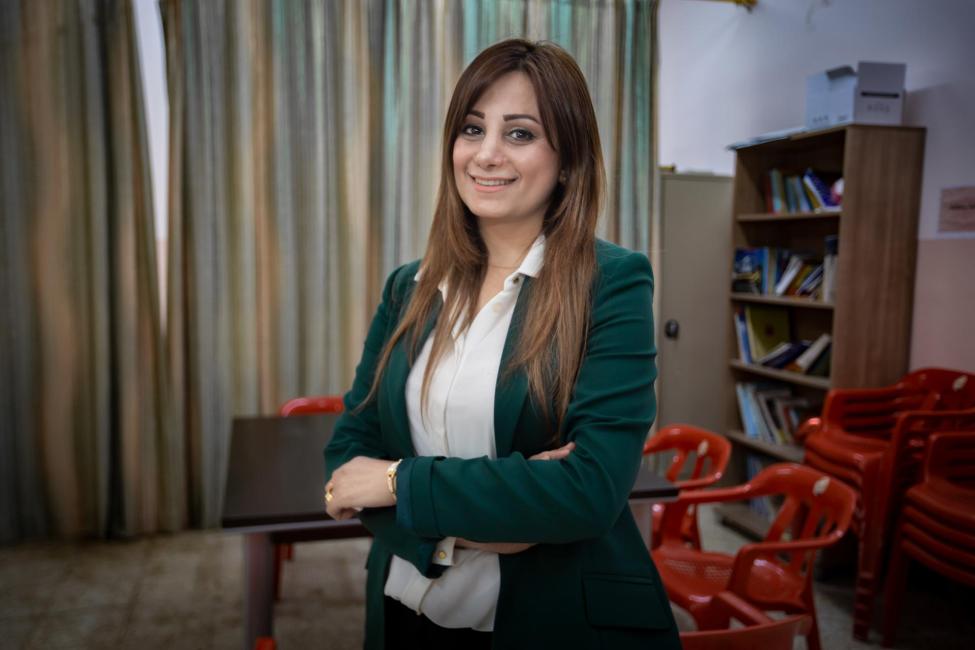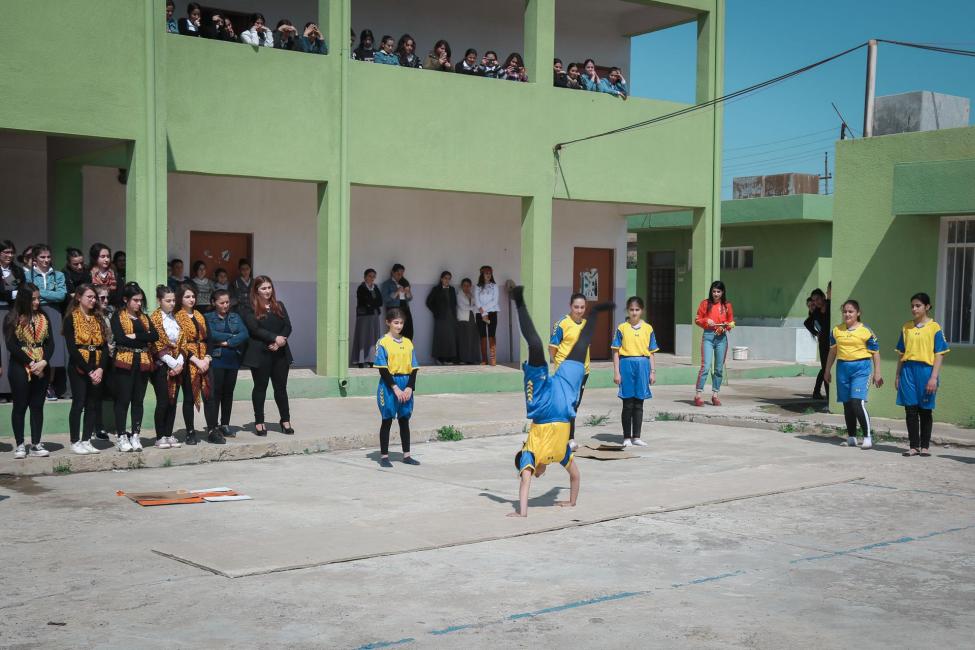-
Who We Are
WHO WE AREThe International Organization for Migration (IOM) is part of the United Nations System as the leading inter-governmental organization promoting since 1951 humane and orderly migration for the benefit of all, with 175 member states and a presence in over 100 countries. IOM has had a presence in Iraq since 2003.
About
About
IOM Global
IOM Global
-
Our Work
Our WorkAs the leading inter-governmental organization promoting since 1951 humane and orderly migration, IOM plays a key role to support the achievement of the 2030 Agenda through different areas of intervention that connect both humanitarian assistance and sustainable development. Across Iraq, IOM provides a comprehensive response to the humanitarian needs of migrants, internally displaced persons, returnees and host communities.
Cross-cutting (Global)
Cross-cutting (Global)
- Data and Resources
- Take Action
- 2030 Agenda
Najlaa, a school teacher, returned to her home district, Hamdaniyah, Ninewa, in 2017 after it was retaken from ISIL.
She returned with great enthusiasm and hope, fully embracing the responsibility to contribute to the reconstruction of the district after years of ISIL control and destruction.
She returned to the school where she used to teach, Zawraa. She is proud of the school because the students come from different ethno-religious groups, reflecting the district’s diversity.
“Our school is like a mini Iraq; like a bouquet of colorful flowers. I want all of us in the school to celebrate this diversity. This is what we need in Iraq, especially in the current circumstances,” Najlaa said.
However, as soon as she started teaching and interacting with the students during the first school year, one thing was immediately obvious: there was a behavioral change in the students.
“Unlike before ISIL, aggressive behaviors, such as cursing and fighting, had become widespread among the students, and there was more tension between the different groups – for example, children would say to one another, ‘you are Christian or Muslim and I don’t want play with you’. Even during sports activities, the students would automatically polarize into Christian and Muslims teams.”
Najlaa explained that this could be attributed to what the children saw, including ISIL violence, and what they went through during their time in displacement. In displacement, many families concentrated in one location and lived in cramped, poor conditions. The destruction that ISIL left behind in Hamdaniyah also impacted people as they returned.
“We arrived to find that everything had been destroyed, burned, and plundered. The town was completely empty, streets full of rubble, and there were no signs of life. This felt strange and had a negative impact on my mental health because I grew up in Qaraqosh. I am attached to it as my place of origin and the home of my neighbors and close friends,” Nadine said.
Nadine managed to overcome her mental health problems with support from her parents and through her participation in community activities, such as cleaning campaigns and planting trees that volunteers at IOM’s community center in Hamdaniyah organized.
Back at Zawraa school, Najlaa decided to do something about her students' behavioral change – something that would set an example for other schools in the district.
“We wanted to change their psychological state to help them build trust and overcome their issues and sensitivities. So, I talked to the school’s principal and he dedicated a room as a friendly space for psychosocial and mental health support activities.”
The support includes both mental and physical activities, such as reading a story together or watching an animation movie and discussing the story afterwards. Some students draw their feelings and post them on the wall to open discussions about how they feel and how to turn negative feelings and emotions into positive thoughts and energy.
“I saw the students were drawn to these activities; they were different from the usual classes. The activities helped them relax, alleviate stress, and build trust. Additionally, I was able to identify those children who needed special attention.”
“After six months of activities, things changed dramatically. One student who did not accept sitting and playing with students from other ethno-religious groups was now interacting, playing, and sharing the same desk with students regardless of their backgrounds.”
“It is very important for our kids to have these friendly spaces. Our kids are psychologically exhausted; they really need this.”
Teachers from other schools are encouraged to follow the same model, building on Najaa’s successful example and the Hamdaniyah Department of Education’s support.
Teachers from other schools are encouraged to follow the same model, building on Najaa’s successful example and the Hamdaniyah Department of Education’s support.
“Najlaa’s model is 100 per cent effective. Students sit in classes doing the same thing every day; seeing the same white board, pens, notebooks, and desks becomes boring. When you set up a room that facilitates fun, educational activities and provides psychosocial support, children will not just enjoy the activities, but mentally relax. We fully support this model,” said Nibras Khaddo Shaba, Teaching Coordinator at Hamdaniyah Department of Education.
“IOM’s training arts therapy sesisons were effective and fruitful in improving the relationships between the students and teachers and between students from different groups. We were able to organize a big arts and sports exhibition this year as a result of improvement in the students’ psychosocial and mental states,” he said.
Najlaa also recalls how her school held its first graduation ceremony last year since people began returning to Hamdaniyah, a sure sign that the schools’ social cohesion activities were having a positive impact.
“It was the most wonderful event. Students wore Qarqoshi dresses, Kurdish and Arabic costumes, and traditional dresses from the Kakayi, Shabaki, and other groups. During the ceremony two students – one Christian and one Muslim – exchanged costumes as a show of love and acceptance. This was very heart warming.”
With support from the U.S. Agency for International Development (USAID), IOM provides support to social cohesion efforts in 12 schools in Hamdaniyah. One particularly popular activity are the weekly art therapy sessions that strive to prevent segregation and restore trust between communities in the post-ISIL era.
On 4 April 2019, students from the 12 schools who had gone through art therapy held an arts and crafts exhibition in Maryam Al-Athraa high school to promote peace and social cohesion. The event drew a sizeable audience from officials and the local community, who enjoyed handcrafted items on show, drawings about peace and hope for the future, and musical and gymnastics performances, amongst others.
“I drew this map to show that all of us, Muslims, Christians, and other ethno-religious groups, work together, hand in hand. We can build an Iraq where stability and peace will prevail, and the dove of peace will take the war and destruction away from our country,” said Diyana Zuhair, a high school student in the district of Hamdaniyah.





















